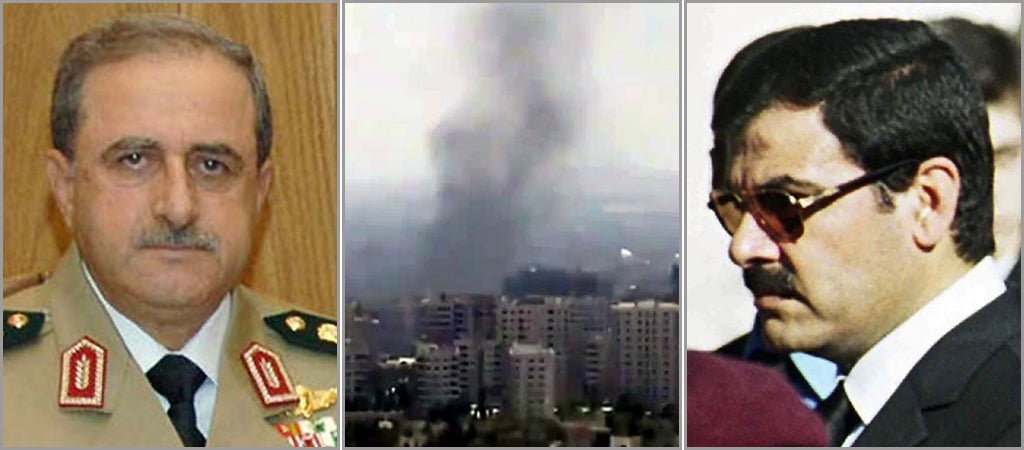Brother-in-law of Syrian President killed in bomb blast as rebels close in on Assad regime
Syria’s Defence Minister Daoud Rajiha was also killed in what is considered to be the harshest blow to the Syrian regime since the uprising began

Your support helps us to tell the story
From reproductive rights to climate change to Big Tech, The Independent is on the ground when the story is developing. Whether it's investigating the financials of Elon Musk's pro-Trump PAC or producing our latest documentary, 'The A Word', which shines a light on the American women fighting for reproductive rights, we know how important it is to parse out the facts from the messaging.
At such a critical moment in US history, we need reporters on the ground. Your donation allows us to keep sending journalists to speak to both sides of the story.
The Independent is trusted by Americans across the entire political spectrum. And unlike many other quality news outlets, we choose not to lock Americans out of our reporting and analysis with paywalls. We believe quality journalism should be available to everyone, paid for by those who can afford it.
Your support makes all the difference.The brother-in-law of Syrian President Bashar al-Assad has been has been killed in a bomb blast in Damascus, the country’s state television confirmed today.
General Assef Shawkat - who was married to Assad's elder sister, Bushra - was the deputy defence minister and among the most feared figures in Assad's inner circle.
Syria’s Defence Minister Daoud Rajiha, the most senior Christian government official in Syria, was also killed in the attack, and interior minister Mohammed Shaar seriously injured.
The attack, considered the harshest blow to the Syrian regime since the uprising began, took place at the headquarters of Syria’s National Security Bureau during a meeting of Cabinet ministers and senior security officials.
Riad al-Asaad, Syria's rebel commander, confirmed that his forces carried out the attack but denied it was a suicide bombing, as was initially reported.
Speaking from his headquarters in Turkey, Riad al-Asaad said that rebel forces planted a bomb inside the room where senior government officials were meeting.
He added that all those who carried out the operation are safe, and claimed the attack marked “the beginning of the end of the regime”.
The attack comes after four straight days of fighting in Damascus, as rebels harden their offensive and try and bring down Assad's regime by force.
The SANA news agency said government troops were chasing rebels in the Midan neighbourhood, causing “great losses among them”, and the UK-based Syrian Observatory for Human Rights said army helicopters had attacked the neighbourhoods of Qaboun and Barzeh.
Although the Syrian government has downplayed the rebels' advance on Damascus, the death of Shawkat and Rajiha, and the recent defection of several high profile officials, will be seen by rebels as signs of a weakening resistance.
Although it is unclear who was behind today's attack, the high-level assassinations could signal a turning point in the 16-month conflict as the violence becomes increasingly chaotic.
Rebel fighters are launching increasingly deadly attacks on regime targets, and several massive suicide attacks this year suggest al Qaida or other extremists are joining the fray.
Shortly after today's bombing, the Syrian army released a statement saying its forces will continue to fight the rebels.
“Whoever thinks that by targeting the country's leaders they will be able to twist Syria's arm is disillusioned because Syria's people, army and leadership are now more determined than ever to fight terrorism ... and cleanse the nation from the armed gangs.”
Shawkat and Rajiha’s deaths come as UN chiefs try to persuade China and Russia to agree to tougher measures on Syria ahead of a Security Council vote to impose sanctions, expected to take place in New York later today.
UN-Arab League envoy Kofi Annan held talks with Russian President Vladimir Putin in Moscow, and UN Secretary General Ban Ki-moon met Chinese leader Hu Jintao in Beijing.
In the aftermath of today’s bombing, however, Sergey Lavrov, the Russian Minister of Foreign Affairs, accused the West of inciting the Syrian opposition.
Lavrov was quoted by the RIA Novosti news agency as saying “instead of calming the opposition down, some of our partners are inciting it to go on.”
Western nations want a new resolution threatening measures short of the use of force.
The Western-backed draft resolution to be discussed gives the Syrian government 10 days to withdraw heavy weapons from cities and return troops to barracks, otherwise a further resolution on sanctions will be submitted to the Security Council.
Join our commenting forum
Join thought-provoking conversations, follow other Independent readers and see their replies
Comments